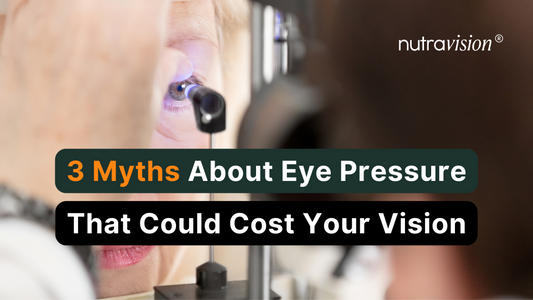Can Ozempic Affect Vision? The Eye Side Effects of Ozempic (and Wegovy)
 Ahmed Zayed
Ahmed Zayed

Ozempic and Wegovy (different brand names of semaglutide) have become household names — not just for managing type 2 diabetes, but also for weight loss. But as more people turn to this GLP-1 medication, a new concern has emerged: can Ozempic affect vision? Are there side effects of Ozempic affecting the eyes? While Ozempic has helped many people control their blood sugar and weight, early research suggests they may also carry risks for eye health.
In this article, we’ll explore what the science says, how semaglutide may influence the eyes, and what you can do to reduce risk to your vision if Ozempic is part of your health journey.
How Does Ozempic Work?
Ozempic contains semaglutide, a synthetic compound that mimics a natural hormone called GLP-1 (glucagon-like peptide-1). This hormone helps regulate blood sugar by:
- Stimulating insulin production when glucose levels rise
- Slowing digestion
- Reducing sugar output from the liver
- Suppressing appetite
While it was developed for type 2 diabetes, Ozempic’s impact on appetite and weight led to widespread off-label use for weight loss — including among people without diabetes. In fact, recent surveys estimate that 12.5% of U.S. adults have used a GLP-1 drug at some point.
But with growing popularity comes growing scrutiny, especially around lesser-known side effects of using Ozempic — including those related to eye health.

Can Ozempic Affect Vision? What Are the Eye Side Effects of Ozempic?
The short answer: possibly — especially in people with underlying eye conditions. Although the most common side effects of Ozempic and Wegovy include nausea, diarrhoea, and stomach discomfort, some users have also reported visual changes. This has prompted researchers to explore potential links between semaglutide and two specific eye conditions:
1. A Possible Link to NAION (Non-Arteritic Anterior Ischaemic Optic Neuropathy)
A 2024 study published in JAMA Ophthalmology investigated the potential association between Ozempic use and a rare eye condition called non-arteritic anterior ischaemic optic neuropathy (NAION), which causes sudden painless loss of vision due to reduced blood flow to the optic nerve.
Researchers reviewed data from 16,827 individuals, and observed a higher rate of NAION diagnoses among people using semaglutide drugs, suggesting this to be an uncommon side effect of Ozempic and Wegovy. While the findings do not prove causation, they raise important questions and underscore the need for further research, particularly in individuals with additional vascular risk factors such as diabetes or hypertension.
2. Risk of Worsening Diabetic Eye Disease
Diabetic eye disease is one of the most common complications in people with diabetes. It occurs when high blood sugar damages the tiny blood vessels in the retina, potentially leading to swelling, abnormal blood vessel growth, and bleeding into the eyeball.
The American Academy of Ophthalmology has issued guidance highlighting that semaglutide may worsen diabetic eye disease symptoms in certain individuals. One theory is that Ozempic’s rapid reduction in blood sugar levels could destabilise already fragile retinal blood vessels — a concern for individuals with long-standing or advanced diabetes.
Supporting Your Eye Health While Taking Ozempic
If Ozempic or Wegovy is part of your treatment plan, you don’t need to panic — but you do need a plan. Supporting your eye health proactively is key.
1. Eat a Nutrient-Rich, Vision-Supportive Diet
Focus on foods rich in:
- Lutein and zeaxanthin (e.g. spinach, kale, corn)
- Omega-3 fatty acids (e.g. fatty fish, chia seeds)
- Antioxidants like vitamins C and E
These nutrients support retinal health, protect against oxidative damage, and help maintain visual function.
2. Consider Targeted Supplementation
While a healthy diet is foundational, it can be difficult to obtain therapeutic levels of certain nutrients from food alone — especially for those with vascular or optic nerve-related eye concerns.
Nutrients that may offer additional support include:
- Bilberry: Rich in anthocyanins that support retina health and is traditionally used in Western herbal medicine to aid night vision
- Ginkgo biloba: Shown to support healthy blood circulation, especially to the eye
- Grape seed: Rich in procyanidins that help reduce free radical damage and support cardiovascular system health
- Methylfolate: The bioavailable form of folate that assists healthy red blood cell production and is essential for cell repair
- Methylcobalamin: The bioavailable form of vitamin B12 that helps reduce homocysteine levels and supports healthy optic nerve function
Both NAION and diabetic eye disease involve impaired blood flow to the ocular tissues, so ingredients that support vascular function and circulation may be particularly beneficial. Just make sure to choose a high-quality supplement with evidence-based dosages and speak with your healthcare provider before starting anything new.
3. Get Regular Eye Exams
Although the side effects of Ozempic and Wegovy affecting the eyes are uncommon, routine checkups with your optometrist or ophthalmologist are essential. Early detection of retinal changes or optic nerve damage can make all the difference in eventual outcomes.
The right frequency depends on your personal health status:
- No diabetes or eye conditions: Every 1–2 years
- Diabetes (without diabetic eye disease): Annually
- Diabetes with diabetic eye disease: As recommended by your eye specialist
Final Thoughts: Can Ozempic Affect Vision?
While Ozempic and Wegovy have helped many people better manage their blood sugar and lose weight, early research suggests a potential link between semaglutide use and certain eye conditions — especially in those with pre-existing vascular issues.
So to the question: “can Ozempic affect vision?” — the honest answer is: there may be an increased risk of eye side effects of Ozempic, and this depends on your health situation. That’s why awareness and proactive care are key.

If you’re looking for a nutritional supplement specifically designed to support visual function, blood circulation, and cardiovascular health, Nutravision may be a valuable addition to your routine. It combines practitioner-grade ingredients like bilberry, ginkgo biloba, grape seed extract, methylfolate, and methylcobalamin to help support your eye-nerve-brain vision ecosystem — along with the circulatory network that nourishes it.
By staying informed, scheduling regular eye exams, and supporting your vision through nutrition and targeted supplementation, you can potentially reduce risk to one of your most precious senses — your sight.



